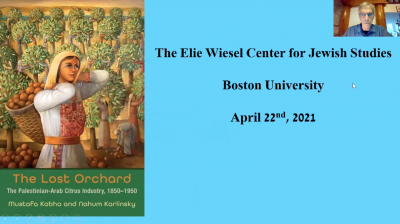The Elie Wiesel Center for Jewish Studies discussed the historical relationship between Arabs and Jewish individuals in Palestine in its third and final book talk last week. The presentation focused on the ethnic groups’ shared history of the citrus market.

The discussion centered around “The Lost Orchard: The Palestinian-Arab Citrus Industry, 1850-1950” — a book that describes the citrus business in the Middle East during that time period, which will be released in paperback May 30.
The event closed the center’s semester-long lecture series that highlighted three books relevant to Jewish and Israel Studies.
Abigail Gillman, a professor of Hebrew, German and comparative literature and member of the Jewish Studies faculty, said in an interview the two authors of “The Lost Orchard” — the Open University of Israel professor Mustafa Kabha and BU visiting professor Nahum Karlinsky — decided to collaborate on a new book, which Gillman said aims to tell the story of the unique alliance of Arab and Jewish citrus farmers that is typically told in a “segregated way.”
Karlinsky’s second book, “California Dreaming: Ideology, Society, and Technology in the Citrus Industry of Palestine, 1890-1939,” that was published in 2012 also discussed the citrus industry. At the talk, he said that book’s perspective was one of many to discover regarding the subject.
“I mainly concentrated on the Jewish-Zionist aspect,” he said. “I grew up on a certain collective identity and understanding of the history, and like me, I think many Israeli Jews grew up on the same narrative.”
The “Lost Orchard” book covers the citrus industry in Israeli history in regard to the idea of the “New Jew” as capitalist Zionist citrus growers who were involved in the labor movement in Jaffa. Kabha has also published work, including “The Palestinian Press as a Shaper of Public Opinion 1929-1939: Writing up a Storm,” in 2007 and “The Palestinian People: Seeking Sovereignty and State.”
But, Karlinsky and Kabha joined research efforts to write their book after they met at a conference in Sde Boker in Israel.
Gillman said “The Lost Orchard” “weaves together two narratives” — an “untold story” of the citrus trade for Jews and Arabs in Palestine.
“This was a symbol of the way that the Jews moving to Palestine were going to make this desert land flourish, create a whole new type of Jew, who was connected to the land,” she said in an interview. “The orange became a great kind of mythic symbol of the flourishing of the land.”
Khadija El Karfi, a Ph.D. candidate in the Department of Romance Studies at BU and a graduate communications assistant at the Elie Wiesel Center who is originally from Morocco, said the event showed her a new side to the history of the Middle East.
“I thought it was interesting to learn more about how this industry was equally divided between Palestinians and Arabs in the region,” she said, “and how it was really a great source of employment for both Arabs and Jews.”
El Karfi read part of Kabha’s writing at the event — who could not attend — and as an Arabic speaker, she was able to read his writing for the group.
“[Kabha] is Palestinian, and professor Nahum wanted me to read a passage that he wrote,” she said, “and because it was very personal and there were a lot of references that were in Arabic, a lot of Arabic names.”
El Karfi read a passage about Kabha’s experience with his father’s stories of Jaffa at the height of the citrus industry and before the city fell in 1948 to Jewish forces.
“‘Whenever I visit Jaffa,’” she read, “‘I’m overcome by emotion and I try to reconstruct past lives amid the lost orchards, the scents of the markets and of the fragrant citrus blossoms.’”
Other books featured in this semester’s “Books at the Center” series focused on “Jewish mysticism,” and the book “The Bible With and Without Jesus,” Gilman said.
Gilman, who organized the series, said the talks were a great use of the remote model and had “strong attendance.”
“Zoom was a wonderful opportunity to do these kinds of talks with authors who are living in Israel and all over being able to come talk about their books,” Gillman said, “and convey important scholarship to the community.”

























































































































